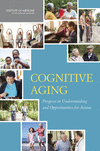Is My Brain Growing As I Age?
Posted on | April 18, 2015 | Comments Off on Is My Brain Growing As I Age?
Mike Magee
Because my father and his sister developed Alzheimer’s disease in their late 70’s, and because they were subjected to a prolonged and painful decline, and finally death, as a result of the disease, my ten brothers and sisters (ranging in age now from the mid-fifties to the early seventies) have been particularly focused on our own brain health. As we learned this past week from the Institute of Medicine’s landmark report, Cognitive Aging: Progress in Understanding and Opportunities for Action, we are not alone. In an AARP report in 2012, 87% of responding members listed staying “mentally sharp” as a top concern.
In the preface to the report, the authors take the time in the opening paragraph to emphasize that the topic of cognitive aging is complex – specifically, the aging brain both gains and loses, and those dynamic changes are individually specific. In their words, “Cognitive functioning in older adults can improve in some areas, such as those related to wisdom and experience, and they can decline in others, such as memory, attention, and speed of processing. Individuals vary widely in the specific cognitive changes that occur with age, in the nature and extent of cognitive aging, as well as in the ways these changes affect daily life.”
The report is both long and broad, touching on a wide range of public policy areas. But what can the individual take away from all this?
A Few Obvious Takeaways:
1. All brains age, both in humans and other species. But all brains do not age the same way.
2. Neuronal death is not a significant feature in brain aging, but it is in neurodegenerative diseases like Alzheimer’s. In fact, some areas of the brain actually show increased functionality as they age.
3. Our basic science understanding of the brain leaves much to be desired. The report admits that this organ, and its alterations with age, is “only now beginning to be understood biologically, yet clearly involves structural and functional brain changes.”
4. Brains like prevention. Specifically, the steps we take to maintain cardio-vascular health and general health – like diet, exercise, sleep, human contact, fresh air – are well appreciated by the brain, and appear to enhance its’ functions. Overmedication – very bad idea!
5. Societies and population health strategies help build and maintain strong brains. Specifically, genetics, culture, environment and social determinants like education, housing, and transportation can help or hurt.
How Am I Doing?
Clearly keeping mentally and physically active; staying engaged with extended family and friends; and ensuring that your physical environment supports both movement and safety all make sense. As for measuring the up’s and down’s of your own brain function, it seems like the science is pretty primative at this point. That would seem to indicate that nearly all of the the supplements and devices that claim to “save your brainpower” are likely bogus.
My Favorite Message?
I like that the aging brain is growing in “wisdom and experience”. Add to this peacefulness, contentment, faith and security, and most of us might actually rejoice in getting older.
For Health Commentary, I’m Mike Magee
Tags: AARP > aging > aging brain > alzheimer's > Brain health > cognition > IOM



